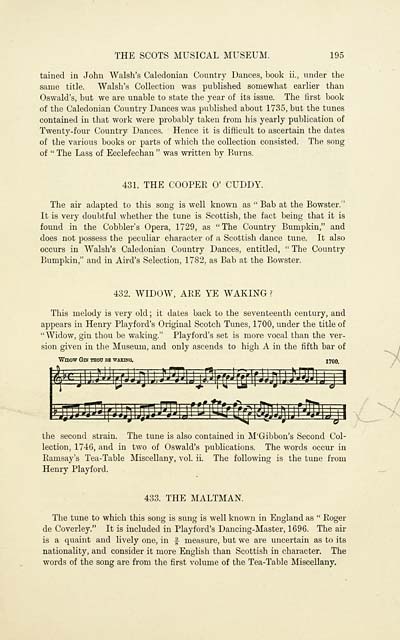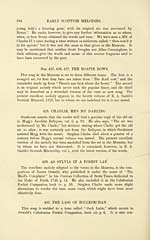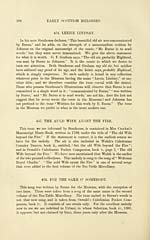Inglis Collection of printed music > Printed text > Early Scottish melodies
(217) Page 195 - Cooper o' Cuddy
Download files
Complete book:
Individual page:
Thumbnail gallery: Grid view | List view

THE SCOTS MUSICAL MUSEUM.
195
tained in John "Walsh's Caledonian Country Dances, book ii., under the
same title. Walsh's Collection was published somewhat earlier than
Oswald's, but we are unable to state the year of its issue. The first book
of the Caledonian Country Dances was published about 1735, but the tunes
contained in that work were probably taken from his yearly publication of
Twenty-four Country Dances. Hence it is difficult to ascertain the dates
of the various books or parts of which the collection consisted. The song
of " The Lass of Ecclefechan " was written by Burns.
431. THE COOPER 0' CUDDY.
The air adapted to this song is well known as " Bab at the Bowster.''
It is very doubtful whether the tune is Scottish, the fact being that it is
found in the Cobbler's Opera, 1729, as "The Country Bumpkin," and
does not possess the peculiar character of a Scottish dance tune. It also
occurs in Walsh's Caledonian Country Dances, entitled, " The Country
Bumpkin," and in Aird's Selection, 1782, as Bab at the Bowster.
432. WIDOW, ARE YE WAKING ?
This melody is very old ; it dates back to the seventeenth century, and
appears in Henry Playford's Original Scotch Tunes, 1700, under the title of
"Widow, gin thou be waking." Playford's set is more vocal than the ver-
sion given in the Museum, and only ascends to high A in the fifth bar of
Widow Gin thou be waking.
WIDOW UIN THOU BE WAKING. 1700.
^i:j | J.J-JJ l cf jJjj |J.J^l.J^ l rCf J^|fJJ.]j|J.J'J3JJ|J j I
ffi§
nnttn
*-*■
frG ft i ^ udPUj i
•*4)\dji*'-*-l
the second strain. The tune is also contained in M'Gibbon's Second Col-
lection, 1746, and in two of Oswald's publications. The words occur in
Ramsay's Tea-Table Miscellany, vol. ii. The following is the tune from
Henry Playford.
433. THE MALTMAN.
The tune to which this song is sung is well known in England as " Roger
de Coverley." It is included in Playford's Dancing-Master, 1696. The air
is a quaint and lively one, in £ measure, but we are uncertain as to its
nationality, and consider it more English than Scottish in character. The
words of the song are from the first volume of the Tea-Table Miscellany.
195
tained in John "Walsh's Caledonian Country Dances, book ii., under the
same title. Walsh's Collection was published somewhat earlier than
Oswald's, but we are unable to state the year of its issue. The first book
of the Caledonian Country Dances was published about 1735, but the tunes
contained in that work were probably taken from his yearly publication of
Twenty-four Country Dances. Hence it is difficult to ascertain the dates
of the various books or parts of which the collection consisted. The song
of " The Lass of Ecclefechan " was written by Burns.
431. THE COOPER 0' CUDDY.
The air adapted to this song is well known as " Bab at the Bowster.''
It is very doubtful whether the tune is Scottish, the fact being that it is
found in the Cobbler's Opera, 1729, as "The Country Bumpkin," and
does not possess the peculiar character of a Scottish dance tune. It also
occurs in Walsh's Caledonian Country Dances, entitled, " The Country
Bumpkin," and in Aird's Selection, 1782, as Bab at the Bowster.
432. WIDOW, ARE YE WAKING ?
This melody is very old ; it dates back to the seventeenth century, and
appears in Henry Playford's Original Scotch Tunes, 1700, under the title of
"Widow, gin thou be waking." Playford's set is more vocal than the ver-
sion given in the Museum, and only ascends to high A in the fifth bar of
Widow Gin thou be waking.
WIDOW UIN THOU BE WAKING. 1700.
^i:j | J.J-JJ l cf jJjj |J.J^l.J^ l rCf J^|fJJ.]j|J.J'J3JJ|J j I
ffi§
nnttn
*-*■
frG ft i ^ udPUj i
•*4)\dji*'-*-l
the second strain. The tune is also contained in M'Gibbon's Second Col-
lection, 1746, and in two of Oswald's publications. The words occur in
Ramsay's Tea-Table Miscellany, vol. ii. The following is the tune from
Henry Playford.
433. THE MALTMAN.
The tune to which this song is sung is well known in England as " Roger
de Coverley." It is included in Playford's Dancing-Master, 1696. The air
is a quaint and lively one, in £ measure, but we are uncertain as to its
nationality, and consider it more English than Scottish in character. The
words of the song are from the first volume of the Tea-Table Miscellany.
Set display mode to: Large image | Transcription
Images and transcriptions on this page, including medium image downloads, may be used under the Creative Commons Attribution 4.0 International Licence unless otherwise stated. ![]()
| Special collections of printed music > Inglis Collection of printed music > Printed text > Early Scottish melodies > (217) Page 195 - Cooper o' Cuddy |
|---|
| Permanent URL | https://digital.nls.uk/94645876 |
|---|---|
| Description | Also: Widow, are ye waking? Also: The maltman. |
| Description | Scottish and English songs, military music and keyboard music of the 18th and 19th centuries. These items are from the collection of Alexander Wood Inglis of Glencorse (1854 to 1929). Also includes a few manuscripts, some treatises and other books on the subject. |
|---|
| Description | The Glen Collection and the Inglis Collection represent mainly 18th and 19th century Scottish music, including Scottish songs. The collections of Berlioz and Verdi collected by bibliographer Cecil Hopkinson contain contemporary and later editions of the works of the two composers Berlioz and Verdi. |
|---|

